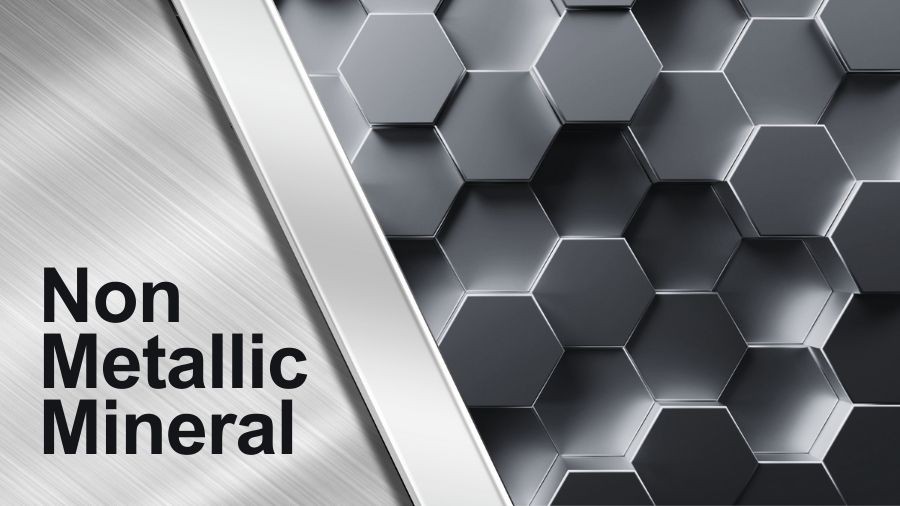Non-Metallic Minerals in India Contributing to Economic Growth and Global Trade
21 December, 2024

India has emerged as one of the leading producers of non-metallic minerals, with a vast array of minerals such as limestone, clay, mica, marble, and gypsum being mined and processed for both domestic use and export. These minerals are essential in a wide range of industries, from construction to manufacturing, and are a significant contributor to India’s economic growth. Non-metallic minerals play a vital role in various sectors, and India's vast geological diversity ensures a steady supply of these materials, making it a key player in the global non-metallic mineral market.
India is a leading producer of non-metallic minerals like limestone, clay, and mica, driving global industries such as construction and electronics. The country’s export of these minerals supports economic growth, with major reserves in Rajasthan and Madhya Pradesh.
Limestone is a key material used in cement production, driving the construction industry in India and beyond. With large deposits found in states like Madhya Pradesh, Chhattisgarh, and Andhra Pradesh, India has become a major exporter of limestone, with demand increasing globally as construction activities grow. Similarly, clay is another vital mineral, used in ceramics, pottery, and the manufacturing of bricks. India’s production of high-quality clay, especially in states like Gujarat, caters to both domestic and international markets.
Marble, found primarily in Rajasthan, is another non-metallic mineral in high demand. India is known for its high-quality marble, used in construction and interior design projects worldwide. The marble industry in India continues to expand as global demand for luxurious and durable materials increases. In addition to limestone, clay, and marble, India is also a major producer of mica, a mineral used in the electronics and automotive industries. Mica, found in states like Jharkhand and Bihar, is essential in the production of electronics components such as capacitors, insulators, and heat-resistant materials.
India’s non-metallic mineral suppliers play a crucial role in meeting global demand. With a network of suppliers offering both raw and processed minerals, India has strengthened its position as a reliable exporter in the global market. Indian non-metallic mineral suppliers offer competitive prices, and many focus on sustainable mining practices to meet international environmental standards. As the demand for these minerals continues to rise, India’s supply network remains strong, ensuring steady exports to countries across Asia, Europe, and the Middle East.
The demand for non-metallic minerals from India has seen a significant boost in recent years, with industries such as construction, electronics, and automotive relying heavily on materials like limestone, clay, mica, and marble. The growing global construction boom, particularly in developing economies, has fueled the need for high-quality minerals. Similarly, the rise of the electronics and automotive industries has driven the demand for mica and other mineral-based products. Indian non-metallic mineral suppliers are poised to benefit from this trend, as they have a competitive edge in terms of pricing, quality, and supply chain efficiency.
Despite its strengths, the non-metallic mineral industry in India faces several challenges. Environmental concerns, such as land degradation and pollution due to mining activities, have led to stricter regulations. The Indian government has implemented measures to ensure that mining activities are carried out sustainably, with a focus on reducing environmental impact. However, balancing the demands of economic growth with environmental sustainability remains an ongoing challenge for the industry.
Additionally, India faces strong competition from other mineral-exporting countries like China and Vietnam, which are known for their competitive pricing and efficient delivery systems. As global markets become increasingly competitive, Indian suppliers must continue to innovate and improve their production and logistics to maintain their market share.
Another challenge facing India’s non-metallic mineral industry is infrastructure limitations. While major mineral-producing states have robust infrastructure, certain regions still face challenges in terms of transportation, processing, and technology. Investments in better mining technologies and improved transport networks will be crucial in overcoming these challenges and ensuring that India can continue to meet global demand efficiently.
Looking ahead, the future of non-metallic minerals in India appears promising. Advancements in mining and processing technologies are expected to increase production efficiency and reduce environmental impact. The Indian government’s initiatives to promote sustainable practices and support mineral exporters will further enhance the growth of the industry. As the demand for non-metallic minerals continues to rise, India is well-positioned to strengthen its position as a global leader in the production and export of these vital resources. The role of Indian non-metallic mineral suppliers in the global market will continue to grow, fostering new trade opportunities and contributing to economic development in India.
